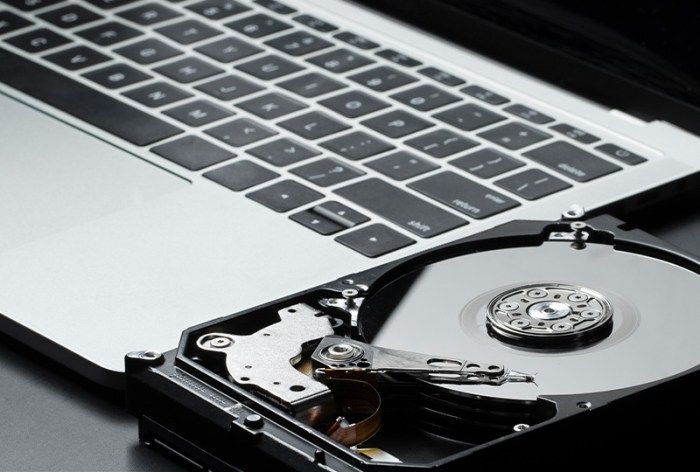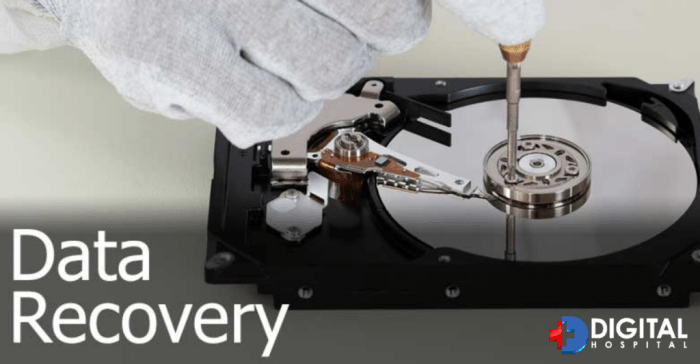
Step into the world of data recovery and computer repair where mysteries are solved, disasters averted, and tech triumphs reign supreme. Get ready for a rollercoaster ride of information and insights that will leave you craving for more!
Let’s dive into the nitty-gritty details of recovering data from damaged hard drives, preventing data loss, and tackling common computer repair issues. Brace yourself for a tech-tacular journey ahead!
Data Recovery and Computer Repair
When it comes to data recovery and computer repair, it’s essential to understand the process of retrieving data from a damaged hard drive, ways to prevent data loss, and common computer repair issues with troubleshooting steps.
Data Recovery Process
When a hard drive is damaged, the data stored on it may become inaccessible. Data recovery specialists use specialized software and techniques to retrieve this data. They first assess the extent of the damage and create a clone of the damaged drive to work on, ensuring they don’t further harm the original data. They then use various methods to extract and recover the data, which can be a time-consuming process depending on the severity of the damage.
Preventing Data Loss
- Regularly back up your data to an external drive or cloud storage to ensure you always have a copy of your important files.
- Avoid clicking on suspicious links or downloading unknown attachments to prevent malware infections that could lead to data loss.
- Install and regularly update antivirus software to protect your computer from viruses and other malicious programs.
- Handle your hard drive with care and avoid physical damage that could result in data loss.
Common Computer Repair Issues and Troubleshooting
Computers can encounter various issues that may require repair. Here are some common problems and troubleshooting steps:
- Slow Performance: Clear temporary files, uninstall unnecessary programs, and check for malware to improve speed.
- Blue Screen of Death (BSOD): Check for software or hardware conflicts, update drivers, and run diagnostic tests to identify the cause.
- Overheating: Clean the internal components, ensure proper ventilation, and consider using a cooling pad to prevent overheating.
- Internet Connectivity Problems: Restart your modem/router, check network settings, and update network drivers to resolve connection issues.
Electronics and Electrical
When it comes to data recovery and computer repair, understanding the differences between electronic repair and electrical repair is crucial. Electronics deal with devices that rely on electrical currents to function, while electrical repair focuses on fixing issues related to the power supply and distribution.
Comparison between Electronic Repair and Electrical Repair
- Electronic repair involves troubleshooting and fixing issues within the electronic components of a device, such as circuit boards, processors, and memory modules.
- Electrical repair, on the other hand, deals with problems related to power sources, wiring, and connections that provide electricity to the electronic components.
- Electronic repair requires specialized knowledge of the internal workings of electronic devices, while electrical repair focuses on ensuring proper power supply and distribution.
Importance of Proper Electrical Maintenance for Electronic Devices
Proper electrical maintenance is essential for electronic devices to function optimally and prevent damage. Without adequate electrical maintenance, devices may experience power surges, short circuits, or overheating, leading to malfunctions or even permanent damage.
Impact of Electrical Issues on Computer Performance
- Electrical issues such as power surges can cause data loss and damage to internal components of a computer, affecting its performance and reliability.
- Improper electrical maintenance can result in unstable power supply to the computer, leading to sudden shutdowns, system errors, and hardware failures.
- Regular inspection of power sources, surge protectors, and electrical connections is important to prevent electrical issues that could impact computer performance.
Computer Repair and Consulting

When it comes to computer repair and consulting, it is essential to understand the role of a computer repair technician in diagnosing hardware issues. These professionals play a crucial role in identifying and resolving technical problems that may arise with computers.
Role of a Computer Repair Technician in Diagnosing Hardware Issues
- Performing hardware diagnostics to identify faulty components.
- Testing various hardware components such as RAM, hard drives, and motherboards.
- Utilizing specialized tools and software to pinpoint hardware issues accurately.
- Providing recommendations for repair or replacement of faulty hardware.
Best Practices for Setting up a Computer Repair Consultation Service
- Offering both in-person and remote consultation services to cater to a broader client base.
- Providing transparent pricing and service packages to ensure clarity for customers.
- Establishing a streamlined appointment scheduling system for efficient service delivery.
- Building strong relationships with clients through excellent communication and customer service.
Benefits of Hiring a Professional Consultant for Computer Repairs
- Access to expert knowledge and experience in diagnosing and resolving complex computer issues.
- Time-saving solutions that can quickly restore your computer’s functionality without extensive downtime.
- Peace of mind knowing that your computer is in the hands of a qualified professional who can provide reliable repairs.
- Cost-effective services that can prevent further damage to your computer by addressing issues promptly.
Data Communication
Data communication plays a crucial role in computer systems by enabling the transfer of data between devices. It allows for the sharing of information, resources, and services over networks, facilitating seamless connectivity and collaboration.
Examples of Data Communication Protocols
- Transmission Control Protocol (TCP): Ensures reliable and error-free delivery of data packets over a network.
- Internet Protocol (IP): Manages the addressing and routing of data packets to their intended destinations.
- Simple Mail Transfer Protocol (SMTP): Facilitates the sending of emails between servers.
- File Transfer Protocol (FTP): Used for transferring files between a client and a server over a network.
Impact of Data Loss on Communication Efficiency
Data loss can significantly impact communication efficiency in computer systems. It can lead to delays, errors, or even complete disruption of communication processes. Without access to critical data, systems may experience downtime, decreased productivity, and potential loss of valuable information. Implementing data recovery solutions is essential to mitigate these risks and ensure smooth communication operations.
Computers E-Books
E-books have revolutionized the way we access information, including learning about computers and technology. They offer numerous advantages such as portability, accessibility, and interactive features that enhance the learning experience.When it comes to computer repair and data recovery, there are several popular e-books available that cover a wide range of topics. From basic troubleshooting to advanced techniques, these e-books provide detailed instructions, tips, and strategies to help individuals solve computer-related issues efficiently.One of the key benefits of using e-books for learning about computers is the ability to enhance computer skills at your own pace.
Whether you are a beginner looking to build a strong foundation or an experienced professional seeking to expand your knowledge, e-books offer a flexible learning environment that caters to different learning styles and preferences.
Popular E-Books for Computer Repair and Data Recovery
- “The Complete Guide to Computer Repair” by Kyle McRae: This comprehensive e-book covers everything from hardware troubleshooting to software optimization, making it a valuable resource for both beginners and experts.
- “Data Recovery for Dummies” by Mark O’Neill: This e-book simplifies the complex process of data recovery, providing step-by-step guidance on recovering lost or corrupted data effectively.
- “Computer Maintenance and Repair” by Charles Brooks: With practical tips and techniques, this e-book helps users maintain their computers and prevent common issues that may lead to data loss.
Graphics and Multimedia
When it comes to optimal graphics and multimedia performance on a computer, having the right hardware is crucial. From graphics cards to display monitors, each component plays a significant role in ensuring a seamless multimedia experience.
Hardware Requirements for Optimal Graphics and Multimedia Performance
- Graphics Card: A dedicated graphics card with sufficient memory and processing power is essential for handling high-quality graphics and multimedia content.
- Display Monitor: A high-resolution monitor with a fast refresh rate can enhance the visual experience and display multimedia content with clarity.
- RAM: Sufficient RAM is necessary for smooth multitasking and running graphics-intensive applications without lag.
- Processor: A powerful processor can handle complex multimedia tasks efficiently and ensure fast rendering of graphics.
Common Issues Related to Graphics Cards and Multimedia Playback
- Driver Issues: Outdated or incompatible graphics card drivers can lead to display problems and hinder multimedia playback.
- Overheating: Graphics cards can overheat, causing performance issues and even hardware damage if not properly cooled.
- Compatibility Problems: Some multimedia formats may not be supported by certain graphics cards, leading to playback issues.
- Hardware Failures: Graphics cards can fail due to hardware malfunctions, resulting in distorted graphics or no display at all.
Tips for Troubleshooting Graphics and Multimedia Problems
- Update Drivers: Regularly update graphics card drivers to ensure compatibility and optimal performance.
- Clean Dust: Keep the graphics card and other hardware components clean to prevent overheating and performance degradation.
- Check Connections: Ensure all cables and connections are secure to avoid display issues during multimedia playback.
- Monitor Temperatures: Use monitoring software to keep track of graphics card temperatures and prevent overheating.
Computers Hardware
When it comes to computer maintenance, hardware plays a crucial role in ensuring the longevity and performance of your device. Regular maintenance of computer hardware components is essential to prevent issues and prolong the lifespan of your computer.
Types of Computer Hardware Components and Their Functions
- Central Processing Unit (CPU): The CPU is often referred to as the brains of the computer, responsible for executing instructions and performing calculations.
- Random Access Memory (RAM): RAM stores data that is actively being used by the computer, providing quick access for running applications.
- Hard Drive: The hard drive stores all your data, including your operating system, applications, and files.
- Graphics Processing Unit (GPU): The GPU is responsible for rendering images and videos, crucial for gaming and graphic design.
- Motherboard: The motherboard is the main circuit board that connects all the components of the computer, allowing them to communicate with each other.
Impact of Hardware Upgrades on Computer Performance
Hardware upgrades can significantly impact the performance of your computer, providing faster speeds, better graphics, and increased storage capacity. Upgrading components like RAM, CPU, or GPU can enhance your computer’s capabilities, allowing you to run more demanding applications and games smoothly.
Summary

As we reach the end of our tech adventure, remember the importance of data recovery and computer repair in keeping our digital lives intact. Stay informed, stay prepared, and let the tech magic continue!
Question & Answer Hub
How can I prevent data loss on my computer?
Regularly back up your data, use reliable antivirus software, and avoid clicking on suspicious links or downloading unknown files.
What are some common computer repair issues?
Common issues include slow performance, software glitches, hardware malfunctions, and virus infections.
Why is proper electrical maintenance important for electronic devices?
Proper electrical maintenance ensures the safety and longevity of electronic devices, preventing damage from power surges or electrical faults.
What is the role of a computer repair technician in diagnosing hardware issues?
A technician identifies and troubleshoots hardware problems such as faulty components, connection issues, or overheating.
How do hardware upgrades impact computer performance?
Upgrading hardware components like RAM or SSD can significantly improve computer speed and overall performance.





